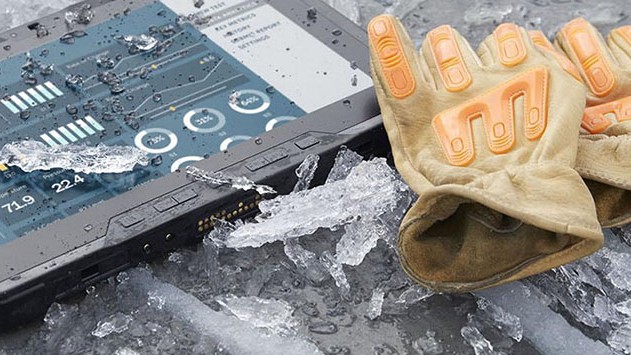The modern warehouse or factory floor is an increasingly digital space. Inventory management and machine controls are shifting away from paper records and analog inputs to data-powered methods for both.
However, transitioning to digital tools requires the right hardware. Computer tablets are often the first choice, as they’re small and light enough for employees to carry while they work. But choosing the right type of tablet is just as important a decision. While there are plenty of consumer-grade tablets available, often right off the store shelf, they aren’t up to the standards needed for an industrial role. Instead, you need a proper industrial-grade tablet to get the job done.
Consumer vs. Industrial-Grade: Understanding Their Purposes
Article Guide
The differences between consumer-grade and industrial-grade rugged tablets are born from their different purposes. Consumer-grade tablets are meant for the broader public and are designed for general computing tasks and personal entertainment. While they can be repurposed for enterprise work, they are typically not meant for business, especially in harsh operating environments.
On the other hand, industrial-grade tablets are purpose-built for harsh conditions. They are designed to be resilient and have design features that make them the ideal computer solution for their intended setting.
Durability
The biggest concerns for tablets in terms of damage are drop protection and liquid spills. Consumer-grade tablets will have some degree of drop protection but not nearly as much as rugged industrial tablets. Industrial tablets use components and features designed to rigorous standards, such as MIL-STD-810G. This military-grade standard measures parameters like shock resistance, vibration, and more. A rugged tablet will integrate features like crack-resistant glass for the screen, shock-absorbing components, and solid-state drives that handle impacts better than hard-disk drives.
Liquid and dust can also be major issues, especially in harsh or outdoor environments. An ingress protection (IP) rating measures how well a device’s case protects its components from dust and water, with IP65 considered the standard for industrial tablets. However, consumer-grade tablets are often not IP-rated at all. This means even minor spills or dust exposure can infiltrate the case and damage the circuitry within.
Battery Life and Recharging
Consumer-grade tablets use rechargeable batteries sealed inside the casing. Recharging requires plugging into an outlet, which limits the tablet’s operations. An industrial rugged tablet can implement hot-swappable batteries that can be exchanged as needed. While expended batteries recharge, fresh ones keep the tablet running, ensuring workers have the computer tools they need throughout their shift.
Customization
A consumer-grade tablet off the shelf will have limited customization options. At best, you may be able to select the data storage size and the color of the casing. On the other hand, an industrial-grade tablet from an original equipment manufacturer (OEM) can be customized with a wide range of storage options, processors, connector ports, and peripheral devices like barcode scanners and RFID readers. This means industrial tablets are far more flexible and can be used in a broader range of roles than their consumer-grade equivalents.
Software Compatibility
Tablets used in industrial settings must be able to run specific pieces of software, such as enterprise resource planning and warehouse management systems. However, consumer-grade tablets (especially Apple products) are meant to operate in a specific ecosystem of apps and software and have severe compatibility issues with anything outside this ecosystem. An industrial-grade tablet running Windows or Linux is far easier to integrate with a business’s software system.
Customer Support and Warranty
Trying to get customer support from tech manufacturers can be a notoriously frustrating experience. Oftentimes, the retailer you purchase a tablet from doesn’t have technicians on staff and will have to send a broken device back to the original manufacturer for repairs. This can add weeks, even months, to turnaround times. Additionally, most consumer tablets only come with one-year warranties. That may be acceptable for the general public, but businesses typically expect to get years of service out of their tablets.
Purchasing an industrial-grade tablet from an OEM ensures that if something goes wrong with your device, you can have it quickly serviced by professionals in-house at the manufacturer. Additionally, the higher degree of design and engineering that goes into industrial-grade devices means they can have longer warranties, up to five years in some cases.
Conclusion
While computer tablets are excellent for those needing a mobile computer solution, not all tablets are created equal. True to their name, industrial-grade tablets are the best choice for an industrial setting. Anything else simply isn’t durable or flexible enough for such an environment.
If your company is looking for industrial-grade computers and tablets to support its operations, contact the team at Cybernet Manufacturing. Our decades of experience designing and manufacturing PCs and tablets for the industrial sector mean we can meet all of your needs, including customizing our products to your exact requirements.
Join the conversation and connect with us on this and other relevant topics – Follow us on Facebook, Twitter, Instagram, and LinkedIn.
Why Choose Rugged Tablets over Consumer Tablets
January 12, 2016
As technology continues to play a more integral in the way companies operate, many are now opting to use mobile tablet computers for their business purposes. In fact, According to Quarterly Mobile PC Shipment and…
0 Comments4 Minutes
You Can't
Learn from a Pop-up
But we can deliver knowledge to your inbox!
We dive deep in the industry looking for new trends, technology, news, and updates. We're happy to share them with you.
Knowledge, News, and Industry Updates Right in Your Inbox



